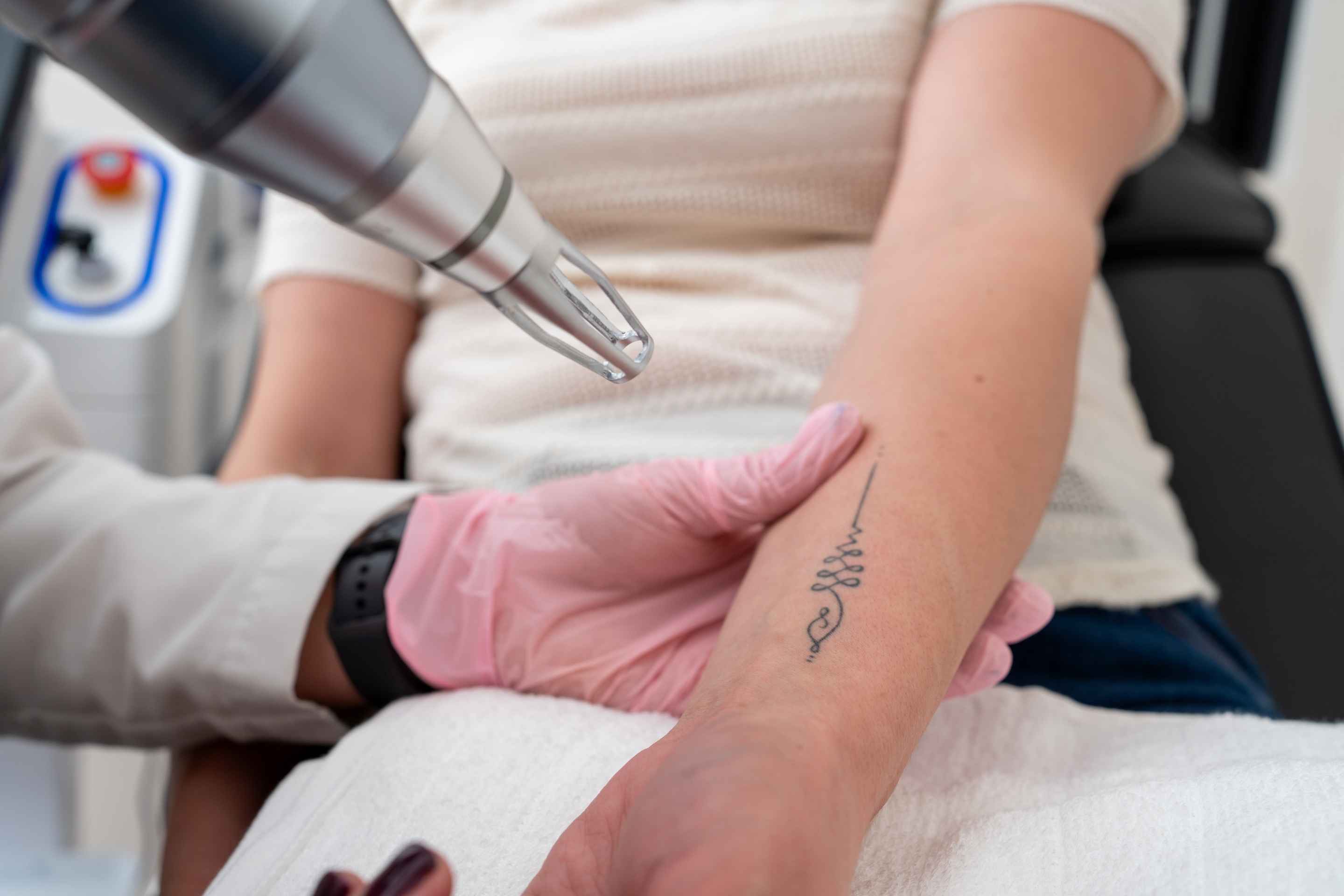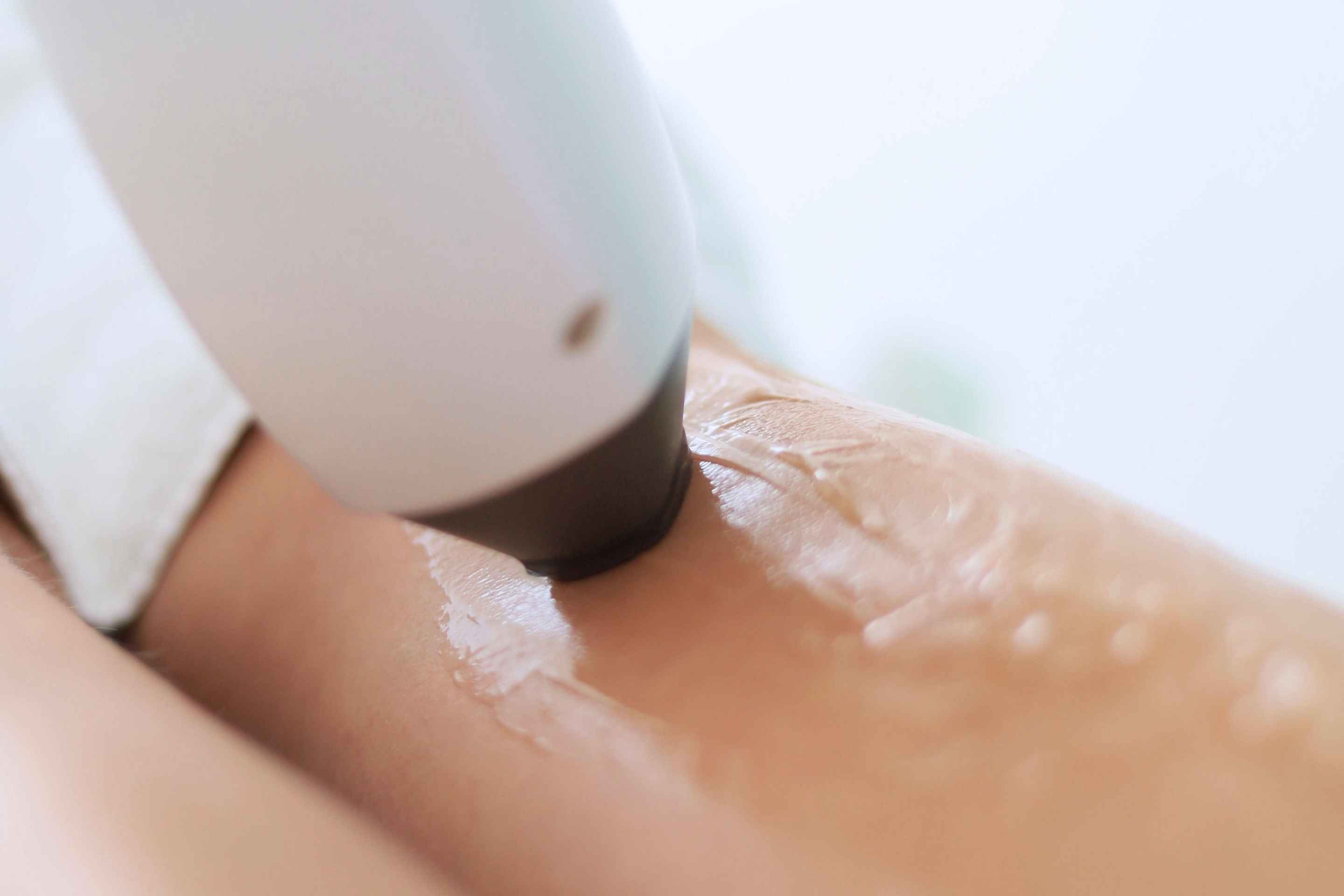What is laser tattoo removal?
Laser tattoo removal consists of breaking down the pigment molecules contained in the skin using a beam of light of very high power and short duration. LE CHARME uses the Alma Harmony XL Pro Special Edition platform, whose Q-Switch Nd:YAG head emits concentrated pulses. The action of the laser is directed directly at the dye, thanks to which the laser acts selectively - it does not violate the surrounding tissues.
The dye molecules are broken down into tiny fragments, which are then absorbed and excreted by the lymphatic system. Due to the mechanism of action, the tattoo fades gradually - after each session it becomes less visible. This technology allows you to completely remove the pigment, regardless of the type of tattoo or its location.
What does tattoo removal look like? Step by step
The course of the laser tattoo removal procedure is precisely planned and always preceded by an assessment of the individual conditions of the patient. It can be divided into several stages.
Preliminary consultation
Each treatment begins with a detailed interview. During the meeting, the cosmetologist evaluates, among others, the type of tattoo, its color, the depth of deposition of the pigment and the age of the tattoo. Contraindications to the procedure are also verified - both permanent and temporary, such as fresh tan, active skin infection or taking photosensitizing drugs. Based on this, the specialist makes a decision whether to qualify the patient for surgery or postpone the appointment.
Preparation of the treatment site
After qualifying for the procedure, the cosmetologist proceeds to the preparation of the skin. The area where the tattoo is located is thoroughly cleaned and disinfected. In order to minimize possible discomfort during the procedure, an anesthetic cream is applied to the treatment site. The duration of its action is usually a dozen minutes - after this period the skin is ready for the next stage.
The right tattoo removal procedure
When local anesthesia begins to act, the right stage of the tattoo removal procedure begins. The cosmetologist guides the Q-Switch Nd:YAG laser head directly over the pigment. The light pulses emitted by the device break the dye into microscopic particles. The procedure itself lasts from 30 to 60 minutes, and its length depends on the location, color and size of the tattoo.
The reaction of the skin after the procedure
Immediately after the procedure, the skin at the site of the laser action may be slightly reddened or swollen. This skin reaction is natural and usually goes away within a few hours. In some patients, small crusts or local exfoliation of the epidermis may appear, which is part of the healing process.
Post-operative recommendations
After the end of the session, the patient receives from the cosmetologist accurate recommendations for further care. Avoid UV radiation, do not scratch the peeling skin, use soothing preparations and keep the treatment site clean — are basic guidelines to support the regeneration process and reduce the risk of scarring. For larger tattoos or more sensitive areas of the body, the healing time may increase.
Does tattoo removal hurt?
During the procedure, patients may experience some discomfort, however, it is not strong. An anesthetic cream is applied to the skin, which reduces complaints to a minimum. A sensation resembling a slight burning sensation is usually the only effect accompanying the procedure.
The procedure does not require recovery — you can return to your daily activity the next day. The reaction of the skin depends on many factors, including individual sensitivity and the area treated with the laser. Most often, the symptoms go away on their own within a dozen hours.
Tattoo Removal — How Many Sessions Are Needed?
For complete removal of the tattoo, a series of procedures is necessary. A single treatment is not enough — the pigment must be broken down in layers, at appropriate intervals, so that the skin has a chance to regenerate. The number of sessions needed to achieve the expected effect depends on a number of individual factors, which are assessed by a specialist at the first visit. Among the most important are:
- The type of dye used to make the tattoo
Some pigments, especially light ones (e.g. white, yellow), are more difficult to remove than dark ones, such as black or navy blue. In addition, the chemical composition of the dye affects its susceptibility to laser action - some substances break down faster, others require more sessions.
- Pigment Deposition Depth
Tattoos made by professionals usually have the dye embedded deeper and evenly, which can lengthen the removal process. In the case of amateur tattoos, the pigment is distributed irregularly, which also affects the effectiveness of subsequent treatments.
- Age of tattoo
Older tattoos are usually easier to remove because over time the dye loses its intensity and some of the pigment is naturally broken down in the body. Younger tattoos, with a fresh and saturated dye, may require more sessions.
- Location of the tattoo on the body
Areas with better blood flow — such as the face, neck or décolleté — usually recover faster, which shortens the intervals between treatments and can speed up the removal process. Areas away from the heart, such as the feet or calves, need more time to heal, and the effect may appear more slowly.
- The size and density of the tattoo
Small tattoos most often require fewer treatments. Equally important is the density of the dye - the more ink is in the skin, the more sessions it takes to completely break it down and expel it.
- Individual skin reaction to the procedure
In each patient, the recovery process proceeds somewhat differently. The reaction of the skin after each session, the healing process and the rate of removal of the dye are factors that affect the length of the entire series of treatments.
Typically, the number of procedures is in the range from 5 to 15. The final number of sessions is determined on a case-by-case basis and can be updated based on the progress achieved after subsequent visits.
Laser tattoo removal — when will the effects be visible?
The first changes can be noticed already after the initial session. The tattoo becomes less visible, its contours weaken, and the color brightens. The healing process lasts from a few to a dozen days, but the full effect is spread over time.
The complete disappearance of the pigment can be expected only after the end of the entire cycle. The time it takes to achieve the final effect depends on the reaction of the skin, the color and structure of the dye, and the location and age of the tattoo. In some people, the full result is visible after just a few months.
Tattoo removal — who is this treatment aimed at?
Laser tattoo removal is a solution for people who want to permanently get rid of pigment from the skin for aesthetic, personal or professional reasons. Especially it is worth considering its execution if the tattoo:
- It was made imprecisely or contains errors
It happens that the final result deviates from expectations - the lines are uneven, the dye has spilled under the skin, and the shape or text are illegible. Such situations result in disappointment and often an attempt at correction, which does not always bring improvement. In many cases, the only effective solution is to remove the tattoo.
- Has ceased to conform to the current image or beliefs
A change in lifestyle, values or simply taste can make old decisions no longer fit the present. Tattoos of an emotional or ideological nature, the meaning of which loses its relevance over the years, can be a source of discomfort.
- Affects negatively on self-esteem and relationships with the environment
For some people, the tattoo causes feelings of shame or complexes — especially when it is in a visible place on a daily basis. It can cause stress in professional, family or social contacts. Removing it can bring relief and provide a sense of freedom.
- Blocks the possibility of professional development
In some professions, tattoo exposure may be perceived as undesirable or inconsistent with the applicable dress code. Tattoo removal is sometimes necessary, for example, in representative professions, uniformed services or formal environments.
The procedure is designed for people who want to get rid of the tattoo permanently, consciously and safely — under the guidance of an experienced specialist, using proven technology. In any situation, the decision to qualify for the procedure is made by the cosmetologist after conducting a detailed analysis.
What are the contraindications for laser tattoo removal?
Laser tattoo removal is a safe procedure, but not for everyone. There are a number of contraindications that may exclude the possibility of performing the procedure — temporarily or permanently. Therefore, each session is preceded by a consultation, during which the specialist assesses the state of health and the condition of the patient's skin.
Contraindications include:
- pregnancy and breastfeeding,
- cancer diseases (during or after treatment),
- epilepsy,
- taking photosensitizing drugs,
- autoimmune diseases,
- tendency to keloids (keloids),
- vitiligo,
- active skin infections at the treatment site,
- fresh tan or planned sun exposure.
Some of these factors are temporary — after they have subsided, it is possible to return to planning a series of treatments. The decision to start the procedure is always made individually and based on the current state of health of the patient.
How much does it cost to remove a tattoo?
The price of the procedure depends on the area of the pigmented area. A single treatment for a tattoo up to 5 cm² costs 250 PLN. For tattoos up to 10 cm², the price increases to PLN 500. For larger projects, individual pricing is used, which is determined during the consultation.
It is worth remembering that the complete removal of a tattoo is a multi-stage process - the final cost depends on the number of procedures. The budget estimate should also take into account the breaks between sessions, the skin reaction and the progress of lightening.
Tattoo Removal — Warsaw
IN Salon of Aesthetic Cosmetology in Warsaw laser tattoo removal is performed using the Alma Harmony XL Pro Special Edition device. Q-Switch Nd:YAG technology allows selective action on the dye without damaging the surrounding tissues. The system allows you to work also on difficult, sensitive areas of the body.
Cosmetologist conducting laser tattoo removal in Warsaw always precedes the procedure with a consultation, analyzing all health and technical aspects. Thanks to this, it is possible to individually adjust the procedure to a specific case and ensure the greatest possible safety for the patient.
FAQ:
- How long does it take to remove a tattoo?
The duration of a single session depends on the size of the tattoo and is usually between 30 and 60 minutes. The entire process of removing an unwanted tattoo can take from several months to a year — a series of treatments is needed, performed at specific intervals.
- How does laser tattoo removal work?
The laser emits short pulses of light that break up the dye under the skin. Fragments of the pigment are then removed by the lymphatic system. This method allows you to effectively reduce unwanted tattoo without disturbing healthy tissues.
- Is it possible to remove permanent makeup with a laser?
Yes, modern devices (such as Q-Switch Nd:YAG) allow you to remove the dye used during the procedure, which is permanent makeup. The process is similar to tattooing and requires an individual assessment of the skin.









